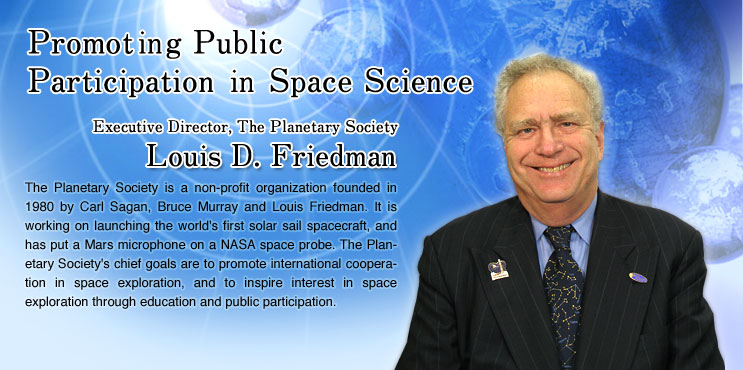 |
|
| Q. Can you explain the planetary mission you are currently directing? | |
| The Planetary Society is conducting its own mission, trying to fly the world's first solar-sailing spacecraft. [The solar sail uses particles of light, or photons, to propel a spacecraft through space, like a conventional sail uses wind power.] It's a long-term interest. Many space agencies - NASA, JAXA, the European Space Agency and the Russians - are all working on solar-sailing technology, but nobody has ever attempted to fly a mission, except for us. This is a privately funded activity, done for only $4-million. We contracted with the Russians for a launch vehicle, which was a converted ballistic missile. We tried in June 2005 to fly this mission, and unfortunately our rocket failed. So now we have to raise the money to try again. But we will try. The reason solar sailing is so interesting is that it is the only known technology that someday may take us to the stars. It doesn't require fuel, so you don't have to carry your fuel along for the long interstellar voyage. |  Solar Sailing Spacecraft Cosmos I |
| Q. Is it difficult to do planetary exploration using private capital?
Yes, I think it's difficult to use private capital for planetary exploration. The Planetary Society actually raised $4-million for this first attempt at a solar sail. But of course, that's an Earth-orbiting spacecraft, and not planetary exploration.
To actually conduct a space-exploration mission, which would cost hundreds of millions of dollars, I think it's unrealistic to think of private missions. Even a private mission to the moon is unrealistic, though there are people who have tried. This is the type of work that governments do. It's very risky, as we know, in space. Always something happens which is difficult. And there's no immediate return. You go there for knowledge, for discovery - the kinds of things that benefit society generally. So it's the kind of thing that governments must do. It's not the kind of thing that can return an investment to somebody who wants to make money.
Q. The U.S. government has reduced its budget for space development over the last several years, especially the budget for basic space science. What do you think about that?
|
I think the chief product of space missions is inspiration. Kids are typically interested in space exploration because it represents a positive future. And this allows them to learn science, and mathematics, and many other subjects. This is very hard to explain to politicians, and sometimes they cut science budgets because they think it's not of great importance to the interests of the country. In the U.S. right now, we're having a disagreement with the budget that has been proposed for NASA, because they've cut science funding. The same in Japan and Europe and Russia, which have all decreased their science funding for space missions. I think that's a mistake. The public is excited about the discoveries from Mars, from Saturn, and they're excited about the great Hayabusa mission. I think the public knows the value of space science. So it's the politicians that we must convince.
Q. What is the Planetary Society's relationship with NASA?
The Planetary Society supports space exploration, and we sometimes urge NASA, and other space agencies around the world, to continue with their programs of exploration, and to help involve the public in this. Sometimes space agencies and governments forget the public interest. They think they're serving just a small group of people. They're not. They're serving everybody. |
| 1 2 3 4 5 |